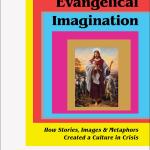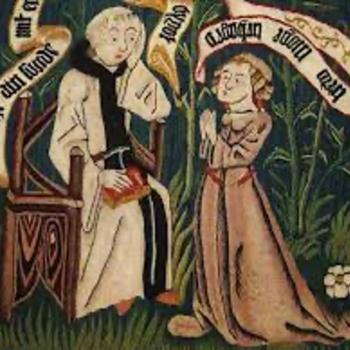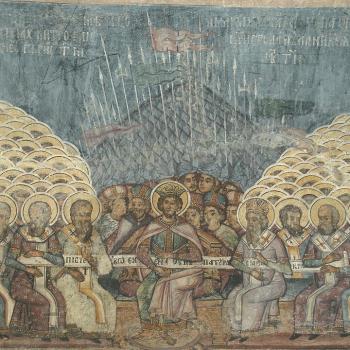(Before I begin, I’d like to note that my last article has proven prescient: in response to the arrest of Trump, his supporters have embraced him as a anti-hero, an outlaw. Read here.)
I am back this week with the first installment of a promised series about Texas megachurches.
About 70% of the church-going public attends only 10% of existing churches– many of these are megachurches. Often evangelical and charismatic, often non-denominational, these hugely influential churches get left off landscape surveys that are framed in terms of denominations. Frankly, to miss what’s happening in megachurches is to get religion in the US skewed. But it’s very hard to get at non-denominational church data.
Fortunately, I live in San Antonio and we have our fair share of megachurches. Today, I am going to reflect on my visits to Community Bible Church (CBC) and, in particular, yesterday’s sermon. My chief interests are as follows: a. the degree of race and gender diversity in their pews and on their stages, b. the salience of charismatic influence in their worship styles and rhetoric, and c. the way leaders may be playing any role in stoking authoritarianism and white supremacy. I am also looking for Christian Nationalism. In what follows, you’ll see: CBC is surprising.
**********************************************************************************************************************
I doubt you know the name Ed Newton.

You’ve heard of T.D. Jakes, I think, and Joel Osteen. You know the big names of charismatic megachurches. I would guess you know the term, “prosperity gospel.” By now, you know about Paula White.
But you probably don’t know Dr. Ed Newton, and until 2016, most people in San Antonio didn’t either. Today, Ed Newton pastors one of San Antonio’s most vibrant megachurch congregations, Community Bible Church (CBC). Like the other four megachurches I’ll profile this fall, Community Bible Church is located on the north side of San Antonio’s loop 1604. When Ed Newton took over CBC, the church was processing a bit of struggle that saw its founding pastor move on. When megachurches trade on the charisma of their leaders, which they are almost uniformly touted to do by scholars and journalists, such a transition is very challenging to navigate without significant loss in members. But Newton has managed to maintain the church’s footprint: today CBC has six services with 18,000 attendees. CBC’s youtube following is at 22.7k and since he preached yesterday morning, 2.7k people have caught the online version. (It’s only been 22 hrs and the video isn’t up on CBC’s own website yet.) CBC’s total church membership is touted to be 27k.
There are things about Pastor Newton that surprise me. At 48, he’s boyish. He used to have a grey beard, but now it’s mostly clean-shaven. He’s energetic– like someone in his 20s. Ed Newton wears converse-like tennis shoes to preach. The few times I have seen him in person, he is wearing all black. (He used to wear more traditional suits, which you can find in older videos.) Yesterday’s look was a loose and untucked button-up black shirt. I’ve seen him at other times in a slim-fitting black suit, black shirt, tennis shoes– no tie. Newton’s hair is close shaven; he looks tan and like he works out. He wears bracelets on his wrist. I have a memory of his saying he recently bought cowboy boots, with over-the-top enthusiasm.
I asked myself if there is a celebrity analog to Newton that I could invoke here, so that you’d be able to picture him better. But the one reference who came up is Woody, from Toy Story, and I am not trying to be disrespectful. The fact that Woody comes up for me reveals, I think, the way Ed Newton doesn’t surprise me. Woody is a cowboy sheriff, right? Jesus and John Wayne has already demonstrated that cowboys are core to evangelical culture. That Ed Newton has a woody-like bearing suggests the range of the myth: Woody is friendly; he’s sentimental. He’s sweet and the hero of Toy Story, a Disney franchise that has grossed 3.3 billion worldwide and has been well-argued to be the “greatest movie trilogy of all time.” Woody might be a global icon.
Ed Newton feels familiar. He says ain’t and has a twang that suggests he’s of the people. He is self-deprecating; funny in a way I think echoes populist humor of the (both American and pentecostal) past–which I have written about. In yesterday’s message he gently pilloried congregants who make rude gestures, “use the middle finger,” at each other in their scramble to find parking. He invited people to greet each other by saying something like, “let your neighbors smell your coffee breath” (21:59). He didn’t make fun of anyone else really, but there was one point in the sermon where he said that communism suggests you can “trust elites with your money.” The audience readily laughed. Newton didn’t mention Nancy Pelosi, Hillary Clinton, or Hunter Biden, but I imagine that this audience can create those connections in their minds. I don’t think this was a dog whistle, but I do imagine that when Trump or a Trump-like politician advances a similar idea, s/he simply changes the tone of what Newton invoked with his statement and adds specific names. Thus, the laughter that emits in a Trump rally is different in tone, but can be received as congruent to, and an extension of, what laughter emanates in Community Bible Church. Still, tone is important.
To the best of my recollection, Newton is married to Stephanie, a hispanic woman, and he says he is trying to learn Spanish. Lots of Spanish is attempted at CBC. Songs are sung in Spanish, sometimes, and translations of English songs and preaching appear on screens. Kate Bowler’s The Preacher’s Wife admonishes that megachurch pastors’ wives trend blonde, so Stephanie’s dark brown hair surprises me. Bowler’s work suggests that Stephanie is allowed to teach because she’s married to Pastor Ed, and this may be true. Megachurch pastors are always married and their wives, I’ve argued, play an important role in making the church intelligible as a family. At the same time, the women in CBC leadership don’t uniformly look like the prim ladies we’ve come to know, like Victoria Osteen, and they seem independent in their roles of leadership. CBC’s staff and leadership pages show the significant presence of women, pictured on their own with titles. CBC doesn’t immediately read as masculinist and doesn’t readily read as culturally white. In an highly visible embedded video on CBC’s website, Newton is still in black but wearing a Mexican guayabera. On his left is a menorah, a clear signal that indicates Newton and his church participate in zionism. The aesthetics of CBC aren’t detectably *white* Christian Nationalism. The church is known to be radically generous on behalf of the city. Once, I saw Pastor Newton instruct members to put money in an offering basket if they could, and to take money from the basket if they need it.
Particularly interesting to me is the style of worship that CBC advances. CBC’s hispanic music leader Phil Vega and (often) Aleena Barrientos (the two aren’t married) sing the same newer songs that researchers have shown are produced by four powerhouses of charismatic music production (Hillsong, Elevate, Bethel and Passion), but they do so from acoustic and electrical guitars, in jeans and tennis shoes. It’s my understanding that Kristin Kobes Du Mez will be blessing us with a book soon on the culture of evangelical femininity and its injunctions to laugh, live and love. Barrientos presents in a different manner. She’s a mother, but she’s not married to the worship leader and from her instagram, it seems as though she’s recently revealed she’s in a new romantic relationship. She does not read as someone who primps.
As you can see from this video, the worship at CBC is not only less prim than one might think. It is also more interracial than one might expect. One of this Sunday’s memorable images features a black young man leading worship while the words to the song crawl across the screen below him, both in spanish and english. You cannot see the crowd from this video, but like most megachurches, CBC is interracial. Given that there are six services a weekend and online watchers, it’s hard to say exactly how interracial, but the audience always seems diverse in terms of race.
I said I would visit this church to check it for Christian Nationalism, so here is my analysis:
Ed Newton said things yesterday that seem aligned with what scholars term Christian Nationalism. He asserted this nation was founded on Judeo-Christian values and that God has been kicked out of government and out of schools. When I am looking for Christian Nationalism, I focus on this idea: that this nation is “built on” Jewish laws and that it must remain so; I think this is core to a Christian Nationalist vision. In one section of his sermon Newton problematized pluralism as “very difficult” because it violates the “principle of non-contradiction,” by which he means: not all religions can be equally true. It seems safe to say that Newton does not have a positive vision for a plural public square; from his preaching it seems like he thinks it just isn’t feasible. Newton sometimes invoked kingdom language that made me think he easily slides from thinking about the nation to thinking about the kingdom of God.
But Ed Newton also said surprising things: he said woke-ism is a problem, but being woke is not. One should be awake, Newton says, to injustices and that black people in particular deserve this recognition of having been unjustly treated both under slavery and its “residues”– which he termed Jim Crow racism–and which residues, he asserted, still obtain in public life. He decried racism as sin, said it requires repentance, and then also said that all LGBTQ persons are welcome at CBC. They are welcome, Newton reasoned, because everyone at CBC is a sinner and no sin is more or less damning than another. He then pointedly stated that if any congregant in the church wanted LGBTQ attendees to be excised from the congregation, that congregant instead should find another church. All this was a bit unexpected.
Also unexpected was Newton’s entire deconstruction of race as a category that, he said, proceeds from darwinism and evolution. I recognized something like early anthropological and colonial accounts of race in Newton’s retelling; he wanted his listeners to understand race as a construct built by science and social scientists who (in the past, yes) advocated for the idea that white people were the most evolved. Newton vehemently made recourse to the equality of ethnicities based on imago dei. In one hazardous rhetorical turn, Newton lamented a person’s being referred to as a monkey as an insult rooted in both racist and darwinist logic. Being made by God means, in this sermon, that all persons are equal. Science is racist, good theology is not was not what I was expected to hear here. Since evangelicals have no love for science as an authoritative discourse, this was a savvy rhetorical move.
The most surprising thing I heard in Newton’s sermon was his invocation of The Frankfurt School. Critical theories and Marxism, Newton said, were problematic because of their deconstructive and divisive approach to society. In one fell swoop Newton offered that critical theory had done the important work of making women aware of long-term pay discrepancies and this was, he owned, very important and true. But isms, Newton then offered, are the problem. Critical theories, Marxism and one can deduce, feminism are problematic inso much as they re-inscribe their own new, maximally important binary: the oppressor and the oppressed. Given this binary, critical theories’ final vision and outcome is for (not liberation, a word I do not think he uttered) but instead destruction. Deconstruction leads to the destruction of the society, per Newton. So while being awake to injustice or woke like Marcus Garvey is good (Newton did invoke Garvey), while black lives do matter and we need to “empathize” with their aim for fair treatment, BLM the entity is bad because it “seeks to destroy” the nuclear family (this has changed, but Newton doesn’t seem to know it) and by extension, society.
Listening to Newton rehearse a history of the term woke, its transformation into “woke-ism,” the benefits and flaws of critical theory, the problem of new binaries; The Frankfurt School, the 1619 project, his transgender friends, and his own mixed-race family–all together make me think Newton is a formidable rhetorician. Since as many as 20k people may hear this sermon, it strikes me as interesting this may be the first or only time they hear about The Frankfurt School.
I think I can safely say that CBC participates in what scholars term Christian Nationalism. But I also think there are ways the church subverts the category. Most important, to me, was a moment when Newton developed a dichotomy between democracy and communism, which category he substantiated as “Russia, China, Venezuela, and Cuba.” Earlier in this same sermon, Newton problematized critical theory as something made by Germans. It occurs to me: this is how pastors do geopolitics. This is where and how church goers get their views of how the US fits into the world–in this case, as a protagonist of democracy and perhaps not the only one. One glance at CBC’s website illustrates the church is also pro-Israel. Newton did not seem to forward the US as perfect, uniquely blessed by God, a city on a hill, or even explicitly exceptional. Instead he invoked communist nations as godless ones, quoting Marx, and invited his fellow Christians to “double down” on the truth of the gospel.
But in depicting polarization as bad and the goals/ends of activism as the destruction of the nation and the family, Newton seems both classically evangelical and Christian Nationalist. In so much as such a vision depends on the centrality of the hetero-patriachal family unit and “the word of God” to this society, Newton’s vision of the family and the nation and the world readily lines up with those of Christian Nationalists. Newton does not, however, seem at all aligned with White Christian Nationalism.
The end of this online version of yesterday’s sermon featured an advertisement for Rebel, a bible study group for men. At the end of Newton’s sermon he pointedly asserted that our culture is trying to break men down. Rebel, I surmise, is the place where they learn to withstand this pressure.
More to come, soon.













